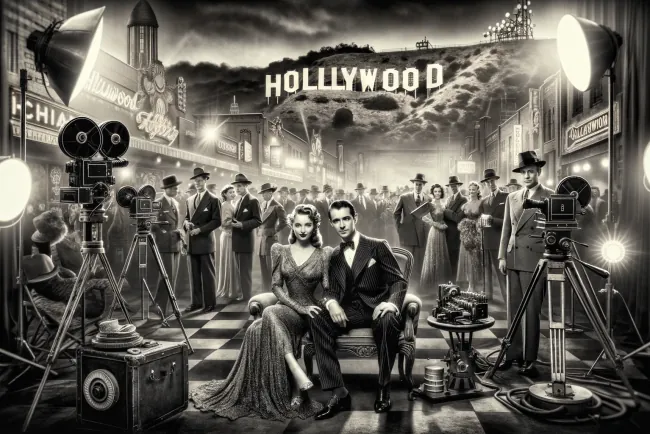Tyler Perry's 'Mea Culpa' Merges 80s Erotica with Signature Drama on Netflix
Explore Tyler Perry's foray into the erotic thriller genre with 'Mea Culpa' on Netflix, starring Kelly Rowland and Trevante Rhodes. This review unpacks the film's drama, suspense, and Perry's unique narrative approach, offering insights into its appeal and audience reception

Outline for "Tyler Perry's Mea Culpa: A Genre-Bending Thriller"
| Section | Subsection |
|---|---|
| 1. Introduction | - Overview of Tyler Perry's Netflix Deal |
| - Introduction to "Mea Culpa" | |
| 2. Genre Fusion in "Mea Culpa" | - Comparison with "A Jazzman’s Blues" and "A Fall from Grace" |
| - Elements of 1980s Erotic Thrillers | |
| 3. Plot Overview | - Main Characters and Plot Setup |
| - The Complicated Dynamics | |
| 4. Character Deep Dive | - Mea Harper: A Lawyer Torn Between Duty and Desire |
| - Zyair Malloy: Charm and Mystery | |
| 5. Stylistic Elements | - Cinematography and Lighting |
| - Score and Its Role in Setting the Mood | |
| 6. Challenges in Chemistry | - Rowland and Rhodes' On-Screen Interaction |
| - Impact of Dialogue and Repetition | |
| 7. The Role of Supporting Characters | - Family and Professional Ties |
| - The Influence of Secondary Plots | |
| 8. The Ridiculous and the Delightful | - Balancing Serious Themes with Humor |
| - The Over-the-Top Finale | |
| 9. Audience Reception | - The Polarizing Nature of "Mea Culpa" |
| - The Appeal to Perry's Loyal Base | |
| 10. Conclusion | - Perry's Mastery of His Craft |
| - The Unique Place of "Mea Culpa" in Perry's Filmography | |
| 11. FAQs | - |
| 12. Further Reading and Viewing Suggestions | - |
Now, let's proceed to the article.
Tyler Perry's Mea Culpa: A Genre-Bending Thriller
SEO Meta Description: Dive into the heart of Tyler Perry's "Mea Culpa," a unique blend of comedy, melodrama, and erotic thriller elements, showcasing the filmmaker's narrative versatility on Netflix.
Tyler Perry, a name synonymous with groundbreaking narrative experimentation, has once again captivated audiences with his latest Netflix offering, "Mea Culpa." Perry, known for his unique blend of comedy and melodrama, ventures into the realm of the erotic thriller, drawing inspiration from the stylistic nuances of the 1980s. This film marks a significant pivot in Perry's filmmaking journey, demonstrating his ability to traverse and meld genres to create something distinctly his own.
Genre Fusion in "Mea Culpa"
"Mea Culpa" is not Perry's first foray into genre experimentation. His previous works for Netflix, including "A Jazzman’s Blues" and "A Fall from Grace," have seen him explore period drama and legal thriller, respectively. However, "Mea Culpa" stands out as Perry's audacious step into the loopy, seductive world of the 1980s-style erotic thriller, reminiscent of classics like "Jagged Edge" and "Fatal Attraction." The narrative follows Mea Harper, a lawyer played by Kelly Rowland, who becomes entangled with her client, artist Zyair Malloy, portrayed by Trevante Rhodes, accused of a heinous crime. This setup is a fertile ground for exploring themes of desire, betrayal, and the blurred lines between professional duty and personal longing.
Plot Overview
The complexity of "Mea Culpa's" plot is a testament to Perry's narrative ambition. The film intricately weaves together the tumultuous relationship between Mea and Zyair with subplots involving familial discord, marital strife, and professional ethics. The inclusion of a murder accusation adds a layer of suspense and moral ambiguity, challenging both the characters and the audience to navigate the murky waters of truth and deception.
Character Deep Dive
At the heart of "Mea Culpa" are its compelling characters, brought to life by Rowland and Rhodes. Mea Harper, caught between her faltering marriage and her intensifying feelings for Zyair, embodies the internal conflict that drives the film's tension. Zyair, with his enigmatic charm, becomes the catalyst for Mea's journey of self-discovery and moral reckoning. Their relationship, complex and fraught with tension, serves as the narrative's core, around which the film's thematic explorations revolve.
Stylistic Elements
Perry's directorial prowess shines through in the film's stylistic choices. The cinematography and lighting are meticulously crafted to enhance the characters' allure and the narrative's erotic tension. Amanda Jones’ score further elevates the atmosphere, attempting to bridge the emotional distance between Mea and Zyair, albeit with varying degrees of success.
Challenges in Chemistry
Despite the film's aesthetic achievements, "Mea Culpa" faces challenges in realizing the full potential of its central relationship. The chemistry between Rowland and Rhodes, crucial for the genre's effectiveness, occasionally falls flat, undermined by stilted dialogue and a lack of narrative cohesion. This disconnect hampers the film's ability to fully engage the viewer in its emotional and suspenseful stakes.
The Ridiculous and the Delightful
Yet, it is in its embrace of the absurd that "Mea Culpa" finds its unique charm. Perry's willingness to lean into the genre's inherent excesses—balancing serious themes with moments of unapologetic ridiculousness—affirms his confidence in his storytelling vision. The film's finale, with its dramatic revelations and over-the-top confrontations, encapsulates Perry's flair for melding drama with a sense of playful self-awareness.
Audience Reception
"Mea Culpa" will undoubtedly polarize viewers, with some dismissing it as mere schlock, while others will admire Perry's audacious genre blending. For Perry's loyal fanbase, the film offers a night of entertainment that, while imperfect, showcases the filmmaker's unyielding creativity and understanding of his audience's desires.
Conclusion
Tyler Perry's "Mea Culpa" stands as a bold experiment in genre fusion, reflecting the filmmaker's narrative versatility and his commitment to exploring new storytelling avenues. While it may not fully reconcile its ambitious thematic aspirations with its execution, "Mea Culpa" remains a noteworthy addition to Perry's eclectic filmography, offering insights into the complexities of desire, identity, and artistic expression.
FAQs
What makes "Mea Culpa" unique in Tyler Perry's filmography? How does the film blend elements of comedy, melodrama, and thriller? What are the main themes explored in "Mea Culpa"? Can "Mea Culpa" be considered a successful genre experiment? What role does the film's score play in setting its mood? How do the film's stylistic choices contribute to its narrative?
What's Your Reaction?






















